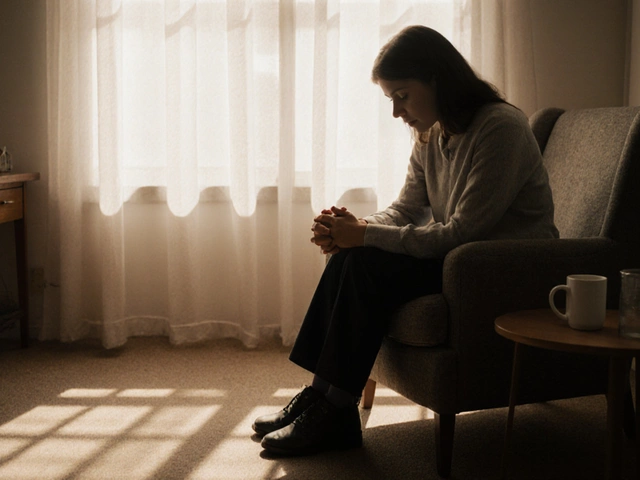Ever catch yourself wondering if you really need to talk to someone or if you’re just “having a bad week”? Most guys avoid the subject until things go totally sideways, but spotting the early signs is way smarter—and a lot less stressful.
If you’ve been dragging yourself through the day, snapping at people for tiny stuff, losing interest in things you used to love, or stuck in overthinking mode, it’s probably time for a check-in. Therapy isn’t just for rock-bottom moments or for people with a “diagnosis.” It’s for anyone who feels stuck, lost, or like their brain just needs a tune-up. Even half an hour a week with a counselor can smooth out the rough edges—the kind of stuff you might not even realize is running your life in the background.
Don’t buy into the idea that you have to be “tough enough” to handle everything solo. That’s old news. Therapy is about skills, not weakness. The right help means you get tools to actually do something about what you’re feeling, not just talk in circles. And no, you don’t have to know exactly what’s “wrong” to start. That’s what a good counselor helps you figure out.
- How Do I Know If I Might Need Counseling or Therapy?
- Breaking Down the Biggest Myths About Therapy
- What Actually Happens in a Therapy Session?
- Taking the First Step: How to Get Started
How Do I Know If I Might Need Counseling or Therapy?
Wondering if it’s time to try therapy or counseling? You’re not the only one. Most people wait way longer than they need to—sometimes years—before actually reaching out. But there are signals that can save you a pile of trouble if you catch them early.
Pay attention to these common signs:
- You feel low, anxious, or angry most days and it doesn’t seem to pass.
- Stuff you used to like feels pointless, or you’ve lost interest in things that once made you happy.
- It’s getting tough to keep up with work, sleep, or daily chores.
- You’re pulling away from friends and family, even the ones you care about.
- Old coping tricks (like working out or talking to friends) aren’t working anymore.
- You keep thinking about one thing—like a break-up, job mess, or family fight—and it’s on repeat in your head nonstop.
- You’re using things like alcohol, gaming, or food just to numb out or escape daily stress.
It’s not just about getting a diagnosis. Even people without an official label might find counseling super helpful. For example, relationship struggles, work burnout, or grief are big reasons people reach out for help every day.
Here’s an eye-opener: Studies from 2023 showed that over 60% of people who started therapy didn’t wait until they “hit rock bottom.” Most were just feeling off their game, stressed, or stuck. They saw noticeable improvements within weeks, especially when they caught problems early.
| Common Reason For Seeking Help | Percentage of Therapy Starters (2023) |
|---|---|
| Chronic stress or anxiety | 38% |
| Relationship issues | 27% |
| Grief or loss | 19% |
| Work burnout | 12% |
| Other (life changes, habits, etc.) | 4% |
If you check off more than a couple of those signs, or if life just feels heavier than usual, it’s a green light to look into counseling. You don’t need all the answers before you start. Just being curious and wanting life to feel lighter is reason enough to take that step.
Breaking Down the Biggest Myths About Therapy
Scrolling online or talking to family, you’ve probably heard a bunch of wild stories about therapy. Most aren’t true, but they still mess with your head when you’re thinking about getting help. So, what’s fact and what’s total fiction?
- Myth 1: Therapy is only for people with "serious" problems or mental illness. Nope. People use therapy and counseling to deal with everyday stress, work stuff, relationships, or even just to grow as a person. Big life change? Feeling stuck? That’s also therapy territory.
- Myth 2: Therapy means you’re weak or can’t handle life. In reality, reaching out for mental health support is no different from seeing a coach for your fitness goals. Most sessions are tools-focused—learning how to manage tough stuff, not just talking about your childhood.
- Myth 3: The therapist will judge me or won’t understand what I’m going through. Therapists are trained to help people from all sorts of backgrounds. They hear everything—no judgment, just problem-solving.
- Myth 4: Therapy is just lying on a couch and venting forever. TV got this one all wrong. Most therapy sessions these days are structured conversations—even video calls from your couch. You set goals and check your progress, not just tell stories.
- Myth 5: You have to keep going to therapy forever. Lots of folks see a counselor for a set number of sessions—a month or two—get some real skills, then hit pause. You can come back anytime. No long-term contract needed.
| Myth | Reality |
|---|---|
| Only for mental illness | Helps with everyday stress and growth |
| Shows weakness | Taking action builds strength |
| Only venting | Focused on solutions and skills |
| Therapy lasts forever | Short-term, goal-based options |
If you’re stuck on whether therapy is “for you,” remember: over 40% of people will deal with some kind of mental health challenge by age 40. No shame in gaining skills to handle life’s curveballs a little better.

What Actually Happens in a Therapy Session?
Walking into your first therapy or counseling session can feel weird—like showing up to a new gym without knowing where anything is. But honestly, it’s way more relaxed than people think. Your therapist’s job isn’t to judge you or “fix” you; it’s more about giving you a space to talk openly and get practical tools for what’s bothering you. Here’s what really goes on:
- First Session Vibes: It’s mostly about breaking the ice. Your therapist will probably ask what brought you in, what you want to get out of therapy, and might cover basics about your past or anything important going on right now. No pressure to spill everything—take it at your pace.
- Setting Goals: Together, you’ll decide what you want to work on. Maybe it’s dealing with stress, sorting out relationships, or handling anxiety. The goal isn’t just to vent—it’s about making a game plan.
- Talking and Listening: Sessions are just conversations. You talk about what’s on your mind, and your therapist listens and asks questions that actually make you think. They might spot patterns or offer a new way to look at your problems.
- Skill-Building: Expect to pick up real-life, practical tools. For anxiety, you might try breathing techniques, journaling, or steps to challenge your thoughts. For relationships, it could be communication tips that actually work outside the session.
- Homework Sometimes: You might get a small task to try before your next visit. Could be as simple as tracking your mood, or testing out a new way of handling stress at work.
Sessions aren’t just for “talking through your week.” If you’re worried about privacy, therapists legally have to keep what you say confidential (except for a few safety rules they’ll explain at the start). About 75% of people who try some type of mental health counseling notice improvement, according to research from the American Psychological Association.
| What You’ll Find in Most Therapy Sessions | Purpose |
|---|---|
| Check-in on how you’re feeling | Monitors progress and keeps you focused |
| Work on specific goals | Gives sessions a clear direction |
| Build coping skills | Helps in real-world situations |
| Review homework (if any) | Makes changes stick between visits |
There’s no test you need to pass or exam to fail. Every therapy session is a mix of talking, listening, and figuring out better strategies for whatever you’re facing. It’s not magic—it’s teamwork, and you’re in the driver’s seat.
Taking the First Step: How to Get Started
Making that first move toward therapy or counseling can feel like a bigger deal than it actually is. Most people wait far too long, thinking they're not "bad enough" yet. But here’s the kicker: data shows half of people with mental health issues wait a full year or more before talking to someone. There’s zero prize for toughing it out solo.
The process to get started isn’t complicated, but you want it to feel right. Here’s what usually works best:
- Figure out what’s bugging you. Write down what’s been going on and how it affects your day. You don’t need a full-blown list, just a couple of examples.
- Choose the type of support. If you want to talk things out or learn coping skills, counseling and therapy both help. Counselors usually deal with life stuff—stress, work, relationships—while therapists can go deeper into patterns and diagnoses. You don’t need to know all the differences up front. Start anywhere.
- Search for licensed pros. Go online, use apps, or ask your doctor for recommendations. In the U.S. alone, you’ve got over 600,000 licensed mental health pros to pick from. Insurance sites and platforms like Psychology Today let you filter by location, specialties, or insurances accepted.
- Check credentials. Make sure they’re licensed and have decent reviews. Don’t be afraid to ask them if they’ve worked with people in your situation.
- Book an intro session. Most therapists offer an initial consult so you can see if it feels like a fit. Try a call or video chat—it’s not an interview, just a straightforward conversation.
Worried about cost? A lot of health plans now cover a chunk of mental health sessions. And if you’re a student or employee, there may be free options on campus or at work. Community clinics or telehealth services can charge as little as $10 to $75 a session if you’re paying out of pocket.
| Method | Average Cost per Session | Availability |
|---|---|---|
| Private Therapist | $100 - $200 | High |
| Community Clinic | $10 - $50 (sliding scale) | Local/Urban areas |
| Teletherapy App | $60 - $120 | 24/7, nationwide |
| School or Workplace Counseling | Free | Enrolled/employed only |
Your first meeting probably won’t solve everything right away. The real win is you’ve started—and you’re showing your brain that getting support is normal. Once you get past the first hurdle, most people actually look forward to the time to just focus on themselves without any pressure or judgment.








